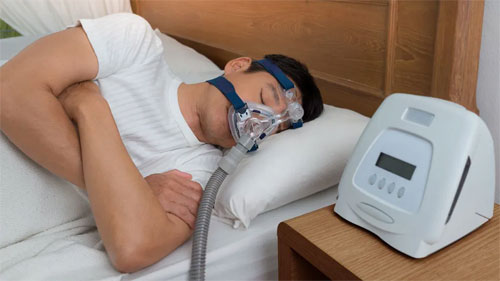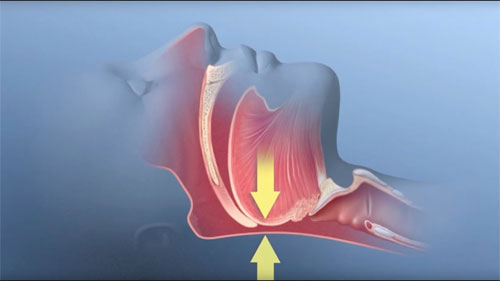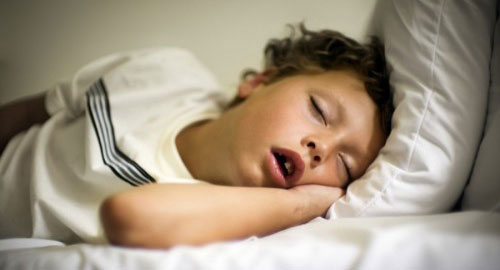The danger of undiagnosed sleep apnea
Some 22 million Americans suffer from mild to moderate sleep apnea, characterized by loud snoring, snorts and choking sounds that result from breath interruptions while you are sleeping.

An estimated 80 percent of moderate to severe sleep apnea cases go undiagnosed, putting you at risk for serious health issues such as Alzheimer’s disease, diabetes, heart disease and obesity.
Commonly attributed to adults, sleep apnea also affects children and infants, and may be a potential root cause for attention deficits, behavior issues and mood problems, as well as bedwetting and sleepwalking.
Lack of sleep and poor quality of sleep have been linked not only to absentmindedness and accidents, but also to serious health risks such as Alzheimer’s disease, diabetes, heart disease and obesity. More than ever, Americans are sleeping less and suffering because of it. Of the many reasons you may be sleep deprived, one of the most dangerous is sleep apnea.
If you are among the 22 million Americans suffering from mild to moderate sleep apnea, your sleep may be punctuated by loud snoring, snorts or choking sounds that result from periodic disruptions to your breathing. Depending on the severity of your condition, these breath interruptions may occur just a few times — or hundreds of times — an hour. During these moments without breath, your brain and the rest of your body is literally being starved of oxygen.
Typically, normal breathing starts again as you gasp for air, resulting in the loud snorts or choking sounds often reported by your sleep partner. While most people consider snoring to be a normal occurrence, or a source of entertainment given the funny noises associated with it, sleep apnea is no laughing matter.
It is a serious health disorder that can be dangerous, and even life-threatening, when untreated. Notably, an estimated 80 percent moderate and severe obstructive sleep apnea cases go undiagnosed. If you think you or someone you love may be suffering from sleep apnea, take action today to pursue a diagnosis and treatment. In doing so, you will be on your way to a better night’s sleep and significantly improved health.
The Importance of Sleep
According to the Centers for Disease Control and Prevention, lack of sleep is a major public health problem, and insufficient sleep has been linked to a wide range of health problems. After reviewing more than 300 studies to determine how many hours of sleep most people need to maintain their health, an expert panel concluded that most adults need around eight hours per night to function well. Children and teenagers require even more.
About 1 in 3 Americans gets less than seven hours of sleep a night, and more than 83 million adults in the U.S. are sleep-deprived. If you work long hours, have a sleep disorder or spend a lot of time in front of your computer, phone or TV, chances are you may be getting five or fewer hours of sleep per night. Such little sleep can trigger a wide range of health repercussions — from an increased risk of accidents, weight gain and chronic diseases, to reduced libido and decreased sensual satisfaction.
It’s important to note the time you spend in bed is rarely equal to the time you actually spend sleeping. You may want to use a tracking device to better understand the quantity and quality of your sleep. If you do you will find on good nights you will not be sleeping for 30 minutes and on bad nights it could be two to three times that or more.
Sleep also plays an important role in in memory formation, and sleep dysfunctions such as sleep apnea have been shown to accelerate memory loss.
Dr. Paul Mathew, neurologist and assistant professor of neurology at Harvard Medical School (HMS), who holds clinical positions at three HMS-affiliated institutions, also believes sleep is vital to your well-being. He states:
“Sleep is a critically important component of human existence. On average, humans spend about 25 to 35 percent of their lives sleeping. Sleep allows both the body and brain to rest and recover from the stress of daily life. As such, trouble sleeping can cause a range of health problems, and, if left untreated, dire consequences.
Even if sleep duration is good, sleep quality can be quite poor. People who wake up many times during the night can have some nights with zero hours of deep, restful sleep. Poor sleep quantity and/or quality can cause excessive daytime drowsiness … chronic fatigue, headaches, mood issues, irritability, poor memory and cognitive dysfunction.”
Three Types of Sleep Apnea and Their Effects on Your Body
The American Sleep Apnea Association classifies sleep apnea in three categories as follows:
Obstructive sleep apnea (OSA) occurs when your tongue collapses against your soft palate, and your soft palate and uvula fall against the back of your throat, blocking your airway while you sleep. The frequent collapse of your airway during sleep makes it difficult to breathe for periods lasting as long as 10 seconds.

Breathing usually resumes with a gasp, jerk or snort, which disturbs sleep for the OSA sufferer and his or her sleep partner. OSA can also reduce the flow of oxygen to vital organs and cause irregular heart rhythms.
Central sleep apnea (CSA) is more of a mechanical problem characterized by a blocked airway and your brain’s failure to signal your muscles to breathe. Specifically, your diaphragm and chest wall do not receive the proper signals from your brain to pull air in and regulate your breathing. CSA may occur due to conditions such as heart failure and stroke, as well as sleeping at a high altitude.
Complex sleep apnea is a combination of the earlier two conditions, resulting in your brain rousing you during each apneic event, usually only partially, to trigger you to resume breathing.
If you have a severe case of sleep apnea, your body may awaken you literally hundreds of times a night. The most intense time for this brief rousing to occur is late in your sleep cycle, during the rapid eye movement (REM) period. When your REM sleep is fragmented and of poor quality, you may suffer many ill effects. In addition, the continuous reduction of the oxygenation of your blood will put further stress on your mind and body.
How Can You Tell If You Have Sleep Apnea?
According to the Mayo Clinic, some of the common signs and symptoms of sleep apnea include:
– Abnormal breathing patterns during sleep,
– Abrupt awakenings with shortness of breath,
– Chest pain at night,
– Difficulty concentrating,
– Hypersomnia (excessive daytime sleepiness),
– Insomnia,
– Mood changes,
– Morning headaches,
– Shortness of breath that is relieved by sitting up
– Snoring,
– Stopped breathing during sleep.
Although it is not necessarily a conclusive indicator of the disorder, snoring is often an early warning sign of sleep apnea. Snoring usually occurs when your breathing is partially obstructed in some way while sleeping. Not only is snoring a nuisance to others, but the majority of people who snore regularly have OSA.
If you or someone you know is affected by two or more of these symptoms, ask your doctor for help in determining if sleep apnea may be the root cause. Here is a simple test you can perform to check whether or not you’re breathing properly:
– Stand with your back against a wall
– Make sure your buttocks, head, heels and shoulder blades are touching the wall
– Say “Hello,” swallow and then breathe.
If you are able to speak, swallow and breathe easily and comfortably in this position, then your mouth and throat are clear of obstructions. If you cannot perform these three functions easily and comfortably, your breathing may be obstructed. If you are having trouble breathing while standing up, you can imagine the situation will be exacerbated when you are lying down to sleep.
How Sleep Apnea Puts Your Health at Risk
Sleep apnea promotes poor health and chronic disease by:
– Reducing the amount of oxygen in your blood, which can impair the function of your internal organs and/or exacerbate other health conditions you may have;
– Slowing down or preventing critical detoxification of your brain tissue, as your brain’s waste removal system, known as the glymphatic system, only operates during deep sleep;
– Disrupting your circadian rhythm, resulting in reduced melatonin production and the disruption of other bodily chemical processes.
A number of studies have highlighted the health risks associated with sleep apnea. For example, sleep apnea may promote:
– Alzheimer’s disease and other memory-related issues
– Gout
– Heart disease
– Pre-diabetes or diabetes
– Tumor growth
In addition, sleep apnea can contribute to feelings of depression. Sometimes, sleep apnea is actually misdiagnosed as depression. The more severe your sleep apnea, the greater your likelihood of feeling depressed, mainly due to lack of quality sleep. Despite the negative bodily effects, many sufferers may be unaware of the tremendous health risks associated with sleep apnea, and therefore resist getting it checked out. Said Mathew:
“In the case of a female patient whose husband refuses to get evaluated despite showing signs of sleep apnea … If improvement of headaches, mood, energy, wakefulness, memory and cognition are not motivation enough, I also advise that untreated sleep apnea leads to an increased risk of stroke, heart attack and dementia … That usually gets people’s attention.”
Sleep Apnea and Children: What You Need to Know

While sleep apnea is most often associated with adults, children are increasingly at risk for sleep apnea and its associated health problems. This is mainly due to the decline in breast-feeding and diets laden with processed food. You may be surprised to learn that sleep apnea, in both its obstructive and central forms, is fairly common among children, including infants. It is particularly prevalent among kids between 2 and 8 years old.
Left untreated, pediatric sleep apnea can lead to:
– Behavior issues such as hyperactivity and poor impulse control
– Cognitive dysfunction and inattentiveness
– Heart disease later in life, especially if the child is, and continues to be, obese
– Mood problems
According to the American Sleep Apnea Association, studies suggest as many as 25 percent of children diagnosed with attention-deficit hyperactivity disorder (ADHD) could be suffering from OSA. As such, many of the behavior problems and learning difficulties attributed to ADHD might actually be consequences of chronic fragmented sleep. In addition, experts suggest bedwetting, failure to thrive, retarded growth, sleepwalking and some hormonal and metabolic problems can be linked to sleep apnea.
If your child has chronic sleep issues, is a mouth breather or snores, you most definitely want to get him or her evaluated by a medical professional to see if he or she may be suffering from sleep apnea. You might also consider Orofacial Myofunctional Therapy.
Myofunctional therapy involves the neuromuscular re-education or repatterning of your oral and facial muscles. It includes facial and tongue exercises and behavior modification techniques to promote proper tongue position, improved breathing, chewing and swallowing.
Proper head and neck postures are also addressed. Some used this therapy to overcome tongue tie, and endorse it wholeheartedly as a potential solution for both children and adults who suffer from mild to moderate sleep apnea.
Treatments for Sleep Apnea
If you suspect you may be suffering from sleep apnea, you will want to seek the help of a qualified sleep specialist. Ask your general practitioner for a recommendation, but don’t be afraid to look beyond the conventional treatments. It’s worth doing your homework, as some sleep doctors offer solutions that treat only your secondary issues. You want to uncover and treat the root problem(s).
Potential treatment options include:
Buteyko Breathing Method: Named after the Russian doctor who developed it, the Buteyko technique can be used to reverse health problems caused by improper breathing, including sleep apnea.
Continuous Positive Airway Pressure (CPAP): CPAP is a special type of sleeping mask prescribed for severe sleep apnea that mechanically restores your breathing by using air pressure to open your airway.
Orofacial Myofunctional Therapy: mentioned above.
Oral appliance: If your mild to moderate sleep apnea is related to jaw or tongue issues, specially trained dentists can design a custom oral appliance, similar to a mouth guard, that you can wear while sleeping to facilitate proper breathing.
Weight loss: If you are obese, you can dramatically improve the effects of sleep apnea by losing weight, which will reduce pressure on your abdomen and chest, thereby allowing your breathing muscles to function more normally.

You might be surprised to learn that when it comes to how you breathe, your diet may play a bigger role than you may have imagined. Processed foods, which tend to acidify your blood in an attempt to maintain normal pH, cause you to breathe more heavily and can lead to chronic overbreathing.
The reason for this is because one of the roles of carbon dioxide, which is in your blood, is to regulate your pH. Water has the least impact on your breathing, followed by raw fruits and vegetables, then cooked vegetables. Processed, high-protein and high-grain meals have the greatest adverse effects on the way you breathe.
Five Ways Poor Sleep Affects Your Body and What You Can Do About It
Even if you do not suffer from sleep apnea, you may experience less-than-optimal health due to poor quality or quantity of sleep. According to Authority Nutrition, consistently getting less sleep than your body needs can cause some or all of these effects:
– Decreases your resting metabolism
– Diminishes your interest in physical activity
– Hampers your ability to fight cravings by increasing your appetite
– Increases your calorie intake, raising your risk for weight gain and obesity
– Increases your risk of insulin resistance
If you identify with any of these outcomes, take action today to get your sleep back on track. Even small adjustments to your daily routine and sleep area can make a big difference. A few of top recommendations are shown below.
Address mental states that may interfere with sleep: Use the Emotional Freedom Techniques to deal with emotional or physical issues that may be interfering with your sleep, including health and relationship problems.
Avoid completely alcohol, caffeine and other drugs, including nicotine: Be aware of the effects these substances, particularly if used every day and close to bedtime, are very likely having on your sleep.
Develop a relaxing pre-sleep routine: Creating a consistent sleep ritual, involving meditation, music, reading, stretching or taking a warm bath, will help cue your body to begin preparing itself for sleep.
Optimize your light exposure during the day, and minimize light exposure after sunset: Get at least 30 to 60 minutes of outdoor light exposure and minimize artificial light exposure at night; sleep in complete darkness, using a sleep mask or blackout shades.
Turn off the TV and other electronics at least one hour before going to bed: Electronic devices emit blue light can trick your brain into thinking it’s still daytime, potentially interfering with your body’s melatonin-secretion process.
yogaesoteric
July 22, 2020
